- Home
- Janelle Taylor
Can't Stop Loving You Page 26
Can't Stop Loving You Read online
Page 26
“And you live here,” Amber said, turning her attention to Noah. “I’ve never been to New York—until now. And I’ve seen pretty much all of it. Well, maybe not everything.”
“Have you been to the top of the Empire State Building?” Mariel asked brightly. “Because Noah took me up there a few nights ago. It’s incredibly…cool.” The last word was forced, as though she had tried and failed to search for a word Amber might use. Here she was, Noah thought, doing what every mother had done in every generation, trying to relate to an adolescent daughter, doing her best to establish a bond through the use of what was undoubtedly outdated slang.
At least Amber didn’t roll her eyes. ‘What are you doing here in New York?” she asked Mariel, as though something had just dawned on her. “Are you two…?”
“We’re not together, no,” Noah said quickly, just in case she was thinking that the three of them could somehow be a family. “Mariel went to Valley Falls to meet you, and when she found out you were missing, she called me.”
“So you guys never got married?”
Again, Noah felt as though she was swinging that twoby-four in a direct hit.
“Not to each other,” Mariel told Amber, and hastily added, “but we’re friends. We became friends again while we were looking for you.”
Noah said nothing.
“You’ve been looking for me?” Amber contemplated that. “I guess that’s why you were in Tompkins Square, huh? I mean, it’s not the kind of place where you go for a stroll after dark unless you’re looking for someone.”
“Or looking for trouble,” Noah said.
Amber flashed him a wry smile. “Yeah, some pretty skeevy things go down in this city after dark.”
“You were lucky,” Mariel said somberly. “You know that, don’t you? Terrible things happen to girls like you on the streets, Amber. You could have been—”
“Don’t remind me,” Amber cut in. “I know. But it was okay. I had friends who looked out for me.”
“And now I guess your adventure is over. I’m sure you’ve had enough,” Mariel said, looking at Noah in a silent cue.
“It’s time to call your parents,” Noah said, standing and walking toward the phone on the desk.
“No!” Amber said sharply. “Not yet!”
“Why not?” He turned and looked back at her. “We have to let them know you’re all right, Amber. They’ve been through hell. They want you back home again, where you belong.”
“But…who says that’s where I belong? In their home.”
“We say it,” Mariel told her firmly. Noah knew it was wrenching for her, but her expression betrayed only resolute assuredness.
“It’s not just their home,” Noah pointed out. “It’s your home, too. That was obvious when we were there.”
Amber glowered.
“We chose the Steadmans from lots of other people who wanted to give you a home,” Mariel told her. “We knew they were right for you. It’s time for you to go back to them.”
“They’re not even there,” Amber said. “Not together, anyway. Now I’m going to be some kid whose parents are divorced. It’s bad enough being some kid who was adopted.”
Hearing her words, Noah froze. He didn’t dare look at Mariel.
“It was bad?” Mariel asked softly after a long moment. “Being adopted?”
“Not so bad,” Amber said in a small voice. “Not until they split up. Then it felt like I didn’t belong anywhere.”
Mariel put her arms around her. Noah walked over to them and sat on Amber’s other side, reaching out to stroke her silky hair as she buried her head on Mariel’s shoulder and sobbed. Mariel was sobbing, too, silently.
“I’m sorry,” she wept into Amber’s hair. “I’m so sorry. I never meant to hurt you. I only wanted what was best for you. And you,” she said, turning her ravaged gaze on Noah. “I only wanted what was best for both of you.”
And for you, he added silently, turning away. Because it was easier to believe that Mariel had acted selfishly.
That way, he couldn’t allow himself…
To love her.
No, he thought, pushing that thought away as emotion welled within him. Not love. This had never been about love. It was about responsibility, and trust, and—
“I had just turned eighteen,” Mariel said tearfully, turning a beseeching gaze on Amber. “I wasn’t much older than you are, Amber. And I was convinced that I didn’t know anything about being a parent. You didn’t deserve me. You deserved so much better. The Steadmans…they were better. She was—she was like my own mother. Trying for so many years to have a child. When you try for that long, and you yearn for it so badly, you’re the kind of mother…well, the kind of mother who will treasure her child.”
Amber was crying, too, her shoulders quaking as she fumbled blindly for the napkin on the table beside her empty soup bowl. Noah handed it to her, and she blew her nose and wiped her eyes.
“When did they tell you that you were adopted?” Noah asked Amber hoarsely, needing to know more. Needing to know that she hadn’t been tormented by the adoption. That it really had been okay.
“They never told me,” Amber said.
Horrified, he started to ask her how she found out. Had she stumbled across the adoption papers?
Then, before he could speak, she clarified, “I mean, I guess it was always just common knowledge in our household. I always knew that I grew in somebody else’s tummy because Mom couldn’t grow me in her own. They said that I was special, and that they wanted me so badly they had to wait for years to have me. Just like you said.”
Mariel nodded, wiping her eyes on the sleeve of her T-shirt. “That’s the truth, Amber. They had wanted a baby for so long, and when they found out they were getting you, they were ecstatic. The adoption case worker told me that they rushed right out and bought a roomful of nursery furniture, and an entire baby wardrobe, and the biggest teddy bear they could find.”
“Dunbar,” Amber said solemnly. “That’s what I used to call him. It was how I pronounced ‘teddy bear.’ I still have him in my room, and he is pretty big.”
There was a wistful note in her voice.
Noah knew that it was time to call the Steadmans. They couldn’t put it off any longer. It wasn’t fair. They deserved to know.
He got up and picked up the cordless phone and walked back over to the couch. Amber, still in Mariel’s embrace, looked at him.
“Do you want to call?” he asked. “Or should I?”
“I will,” she said in a small voice, and took the phone.
They watched her dial.
She stood up and said, “Can I talk to them in the other room? Just, you know, so that I won’t feel…”
“Go ahead,” Noah told her.
She walked toward the hall carrying the phone.
He looked at his watch. It was past midnight. He knew what they would think when the phone rang at this hour. Maybe they should have waited until morning to call, if only to spare her parents the heart-stopping moment of fear.
“Daddy?” Amber asked, and her voice broke. “You’re there? You’re at home?”
And then she was sobbing, taking the phone into the bathroom and closing the door behind her.
Noah looked at Mariel.
She stared back at him.
“So,” she said softly, after a minute. “It’s over.”
He nodded. “It’s over.”
And he knew that they weren’t talking about the search for their daughter.
The three of them passed the next four hours in the living room, on the couch. Noah made coffee, and even Amber drank some, saying that she wanted to be awake when her parents arrived.
“You should sleep, though,” Mariel told her, worried about her exhaustion. “They won’t be here for a long time.”
“I can’t sleep now,” Amber said, stifling a yawn. “When I finally do get into bed, I’m going to be out for a lot longer than a few hours.”
Amber sat betwee
n Noah and Mariel on the couch, and they drank their coffee, and they talked about their lives. Mostly, Amber talked. Now that she had spoken to her parents, she seemed to have come alive.
When she had emerged from the bathroom after a five-minute conversation, and after relaying directions, courtesy of Noah, she had excitedly told Noah and Mariel what they already knew: that her father had answered the phone.
He had told Amber that he was staying at home with her mother and had been ever since she disappeared. Amber asked him if it meant he was home to stay, but he wouldn’t confirm or deny that.
It didn’t seem to bother her. It was apparently enough, for now, to know that there was still hope for her parents’ marriage. The two of them were coming together to New York City. They had refused to wait until morning, but had told Amber that they would be on the road as soon as they got dressed.
Amber had taken a shower and washed her hair, and though she still looked haggard, it was a vast improvement. Her hair fell in soft, sweet-scented waves past her shouders. She wore a pair of Mariel’s shorts and one of her polo shirts, and the clothes fit perfectly. Mariel had told her to keep them.
She couldn’t help wistfully imagining what it would be like if she had a daughter who borrowed her clothes—a daughter she could shop with, a daughter whose hair she could brush and braid, a daughter she could teach to shave her legs and put on make-up and whatever else it was that mothers shared with their daughters…
Whatever else Mariel had missed, all these years apart from Amber.
As Amber chattered, telling Noah and Mariel what her life had been like, Mariel clung to every detail. Her daughter spoke of things they had already learned: that her best friends were Sherry and Nicole, that she liked to surf the Net, that she had played the lead in the school musical Hello, Dolly.
She told them things Mariel had suspected, based on clues she had gleaned from that fleeting visit to the Steadmans’ home: that she played the piano, and that she loved to read, especially the Harry Potter series.
There was so much more.
Amber had broken her right arm when she was seven and fell off the monkey bars at school, and her parents had spoon fed her while she was in the hospital so she wouldn’t have to move it.
For Amber’s tenth birthday, her parents had given her a surprise pool party, inviting ten of her girlfriends. The food was all red, white, and blue in honor of the patriotic date—pizza and Hawaiian punch and blueberry pie with vanilla ice cream.
When Amber was in seventh grade, the school bully had inexplicably threatened to beat her up, and her father had walked her to school every morning, making himself late for his own job, for the entire year.
There were countless stories of a childhood that was largely unremarkable, and for the very small-town normalcy of her daughter’s life, Mariel was grateful.
There was a tremendous amount of evidence that Amber had been cherished.
Mariel knew, beyond a shadow of a doubt, that she had been wise to choose the Steadmans. Now, at last, she was able to banish any last shred of concern. Whatever their marital difficulties, the Steadmans had been the kind of parents she and Noah could never have been. Not back then, at least.
As for now…
But now didn’t matter. Now wasn’t really now; now was over. It had, in these last hours together, become then, a part of the past, along with everything else they had ever shared.
She would be catching the first flight back home as soon as Amber left with her parents.
There was no reason to prolong her leaving. The longer she dragged out this good-bye, the more it would hurt.
“Can I visit you both again?” Amber asked suddenly.
Mariel faltered. “If your parents think it would be a good idea, then I would like that, Amber.”
“I don’t think they’d mind.” Amber looked at her watch, then at the door. “Don’t you think they should be here by now?”
“It’s a long drive,” Mariel said, reaching out to brush back a strand of hair that had fallen across Amber’s cheek.
“You don’t think something could have happened to them?” Amber asked worriedly.
“No, I’m sure they’ll be buzzing the door any minute now,” Noah reassured her.
Mariel realized that it was the first time he had spoken in awhile. She looked past Amber, and her gaze collided with Noah’s, but only momentarily. He stood abruptly and picked up his coffee mug.
“I need a refill,” he announced. “Does anybody else want more?”
“I’ll have some,” Amber said.
“I hope you’re not developing a bad habit,” Noah teased. “Caffeine is addictive, you know.”
“Hey, cut me a break,” she said lightheartedly. “I never drink coffee at home. Normally I can’t stand the stuff.”
“Well, you’d better go easy on it,” Noah said, “or you’ll stunt your growth, and the next thing you know, you’ll be—”
His words were cut off by a loud buzz.
Amber bolted off the couch. “That’s them!”
Mariel’s heart sank.
She had known this was coming. She had to accept it…along with everything that would follow.
Numb, she watched Noah press the button that allowed Amber’s parents to enter the building. Then she rose to stand beside him at the door, behind Amber, who peered out into the hallway anxiously.
When hurried footsteps sounded on the last flight of stairs, Amber flew out the door and rushed down the hall.
Mariel watched through tear-filled eyes as her daughter hurtled herself into the arms of her parents.
She felt a hand on her shoulder and turned to see Noah looking down at her, his own eyes brimming with emotion. “It’ll be okay,” he said softly.
She nodded.
How many times had they said just that?
These past few days…
And fifteen years ago, when she was pregnant and terrified, needing to believe that she was making the right choice. Even in labor, when she had writhed in agony and Noah held her hand for hours upon hours, reassuring her whenever she cried out in anguish. He had known that her torture was as much emotional as it was physical, and she had known that he shared that part of the burden. That his words were meant to comfort her as much as himself.
It’ll be okay.
But it hadn’t been okay.
It had never been okay, until now.
Now, at last, as she watched the three Steadmans tearfully embrace in the dimly lit stairwell, she knew that this much, at least, really was okay.
She and Noah had created a family.
It just hadn’t been theirs.
Carl Steadman turned toward them first, his arms wrapped around Amber. “Thankyou,” he said hoarsely. “I don’t know how to thank you. Both of you. You’ve given us our daughter for the second time in our lives.”
Mariel tried, and failed, to find the right words. All she could do was smile through her tears and know that beside her, Noah was doing the same.
When the Steadmans left Noah’s apartment, the sun was rising over Manhattan.
He closed the door behind them and went to the window. If he craned his neck, he could see past the towering buildings that lined the opposite side of the block. He could see the sky streaked with pink and gold, and he could tell that it was going to be a beautiful day.
Behind him, there was a clinking sound as Mariel gathered the five coffee cups from the table and carried them to the kitchen. He heard her running water in the sink.
He didn’t turn around, and he didn’t go to help her.
When the Steadmans were here, he could allow himself to be distracted.
He could make awkward conversation, and he could watch them fuss over their daughter.
Of course, Amber had sat between them on the couch, in the exact spot where she had earlier sat between Noah and Mariel.
He had been conscious of the older couple glancing around his sorry excuse for a home, had felt them weighin
g it against their own house back in Valley Falls.
Or maybe it was just his imagination.
Maybe he was the only one making a comparison.
They had stayed only a half an hour or so, long enough to assure themselves that Amber was all right, and to drink a cup of coffee to refuel themselves for the road, and to apologize for suspecting that Noah and Mariel had had anything to do with their daughter’s disappearance.
“It’s all right,” Mariel had told them. “We would probably have done the same thing, in your shoes.”
And Noah found himself desperately wishing that he was in their shoes as they ushered their daughter out the door, with a promise to keep in touch.
Amber’s hug still lingered on his shoulders, along with the echo of her parting, whispered words, “Please let me be in your life. Please stay in touch. I want to see you again.”
He had nodded.
And he would see her again.
It was Mariel he wouldn’t see.
Now that they were alone together, the inevitable loomed.
He heard her footsteps behind him, returning to the living room.
“I guess I should go straight to the airport,” she said.
There.
It was finished.
He refused to allow himself to flinch at her words. He simply nodded, still staring out the window at the sky, where a lone bird soared above the buildings.
“I’ll take a shower and change my clothes,” she said.
He nodded again.
She seemed to be hesitating in the doorway behind him.
He was irritated.
What did she want him to say?
What did she want him to do?
Try to stop her?
Well, he wouldn’t. He had tried that already. Twice, in fact.
Twice, he had begged her to spend her life with him.
Twice, she had refused.
He had had enough.
This time, he would let her go.
He heard her footsteps retreat, and then the bathroom door closed quietly behind her.
Mariel felt as though she was living a recurring nightmare as she stood on the street beside Noah, her luggage at her feet.

 Shadowing Ivy
Shadowing Ivy Chase The Wind
Chase The Wind By Candlelight
By Candlelight Kiss of The Christmas Wind
Kiss of The Christmas Wind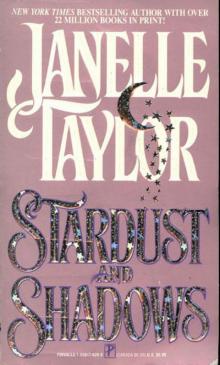 Stardust And Shadows
Stardust And Shadows Forever Ecstasy
Forever Ecstasy Destiny's Temprtress
Destiny's Temprtress Haunting Olivia
Haunting Olivia Wild Is My Love
Wild Is My Love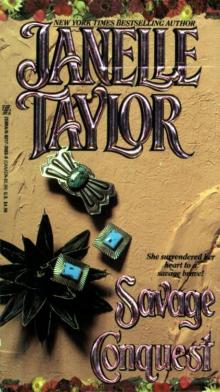 Savage Conquest
Savage Conquest Valley of Fire
Valley of Fire A Christmas Surprise
A Christmas Surprise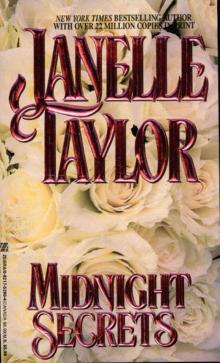 Midnight Secrets
Midnight Secrets Dying To Marry
Dying To Marry Brazen Ecstasy
Brazen Ecstasy Someday Soon
Someday Soon Savage Ecstasy
Savage Ecstasy Can't Stop Loving You
Can't Stop Loving You Golden Torment
Golden Torment Forbidden Ecstasy
Forbidden Ecstasy Fortune's Flames
Fortune's Flames First Love Wild Love
First Love Wild Love Follow The Wind
Follow The Wind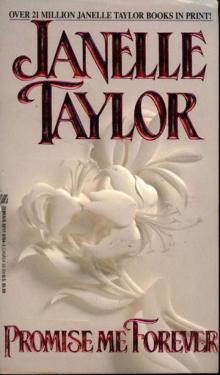 Promise Me Forever
Promise Me Forever Love Me With Fury
Love Me With Fury In Too Deep
In Too Deep Lakota Winds (Zebra Historical Romance)
Lakota Winds (Zebra Historical Romance) Anything For Love
Anything For Love Cherokee Storm
Cherokee Storm Straight From The Heart
Straight From The Heart Don't Go Home
Don't Go Home Wild Winds
Wild Winds Tender Ecstasy
Tender Ecstasy Defiant Ecstasy
Defiant Ecstasy Defiant Hearts
Defiant Hearts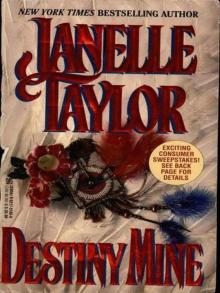 Destiny Mine
Destiny Mine Lakota Flower
Lakota Flower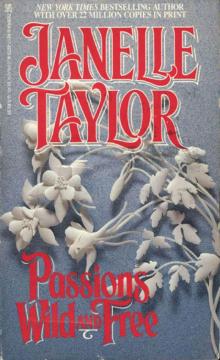 Passions Wild And Free
Passions Wild And Free Sweet Savage Heart
Sweet Savage Heart Stolen Ecstasy
Stolen Ecstasy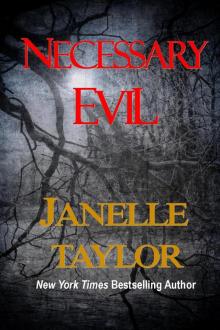 Necessary Evil
Necessary Evil Lakota Dawn
Lakota Dawn